
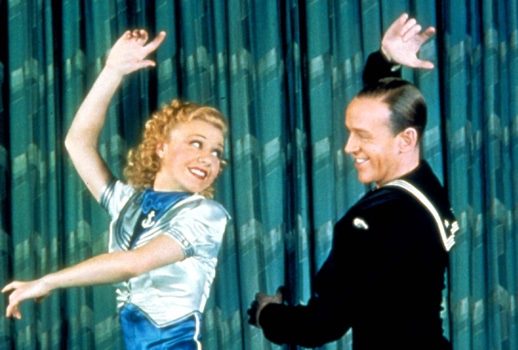
You call this a tale of romance?
I broke up with my first lover over the phone and while watching TV. I’m not proud of this.
Still, that’s an indication right there, wouldn’t you say? that we – Lili and I – had prolonged things beyond their natural life? That we were no longer synchronized? We had begun matters, how many years before? three? two? delighted with each other’s odd impulses and reactions and confidences and curious humors. Now a phone call on an idle night had become a source of conflict.
You see, this was back before VCRs were common, so when public television announced a showing of The Tristan and Isolde Storyin a rare, uncut print, I had to watch. I lowered the lights, set out a pad for taking notes and poured a glass of beer.
The movie had barely begun when the phone rang.
I always had the phone attached to the wall whenever I moved into a new apartment, so that no matter how cluttered the place got I could always find the phone, and I always made sure it had a very long cord, so I could do other things while talking on the phone. On this particular night, as I drew the cord into the living room so I could keep an eye on the screen, I found I’d already missed the movie’s credits. I only saw, out of the corner of my eye, that the dances were by Hermes Pan.
“I want to talk to you. About me. And Phil. And you.”
“I wish we could discuss this in person,” I said. “I think it’s important that we get everything clear.” I tried to sound noble, concerned about us, but I hated to be missing the movie. Of course I didn’t say that. Later, it was too late to say it.
“Why do you feel this way? Tell me why you feel this way. Are you being honest with me? Is it Linda? I have no influence over Linda. I want you to have Linda, Phil isn’t possessive about her, and –”
We’d always been able to discuss our attraction to others, confide our seductive stratagems, console, in whatever fashion, disappointments. We thought this very adult, like a French novel, but it was really a safety measure. It spared us the responsibility of being the sole object of the other’s need.
I was not sure I was as much in love as Lili was, or as I ought to be, or what exactly I did feel other than lustful but terrified – of hurting her, of being hurt myself. The whole thing worked pretty well for some time because we were both more involved in our heads than in our bodies. Until the matter of Linda and Phil.
“This has nothing to do with Linda,” I said, hoping Lili would talk enough for two and not expect me to sift her too carefully. Meanwhile, on the screen, a vast, classy ocean liner appeared, close-up on the name, “S.S. Dumnonia,” dissolve to the boyish face of a sailor (Carleton Carpenter? perhaps), who began to keen a vaguely nautical air.
Westward sails the ship –
It leaves my Irish gal behind –
Are your sighs unfurling?
Do they send us whirling?
West, oh west, flies the ship –
East, out east, slides the shore –
Sweet Irish gal – my winsome, wild Irish gal!
The tune, a cappella to begin with, slowly acquired strings, horns, pounding drums, until the rhythm, from slow and folksy, segued into a smoky blues with the theme, double time, now in the relative major. Dazzling, just to keep track of it all: the energy! the kitsch! and the coincidence of images, as the sailors shuffling on deck became, ever so gradually, groups of dancers, hornpiping with a hint of hep, until, at a breathless pause, rows parted for a dapper figure in dress whites, captain’s cap at a rakish skew – Fred Astaire, of course.
He swashed about the deck, partnering nautical motif upon nautical motif in apparent serendipity: up gunwhales, down gangways, tiptoeing from funnel to funnel, comically upset by the simulated rolling of the ship – this was all filmed on a soundstage on dry land, of course – recovering himself at the last and turning his lost footing to exquisite account. Cinematic whipped cream.
But in my ear Lili demanded what I thought of her suggestion. I hadn’t heard it, but I wasn’t going to admit that. “This is a bad time to discuss things. We should all cool down and then get together –”
“Cool! I’m cool. Phil’s cool. You’re the one who’s upset, and you won’t tell me why. If it isn’t Linda and nothing has changed –”
There was no calming her down. Besides, the dance had reached its climax in a blaze of tap on the top deck, where the camera, descending as though to fix, adoringly, on Fred’s frantic feet, went below a cutout to the luxurious stateroom below them, and Ginger Rogers awaking, in a rage, to the rhythm on the ceiling. Furiously she summons her best pal, Brangaene (Helen Broderick – or was it Joan Blondell?), who cracks wise in response:
“Honey, when I suggested you take a gander at Tintagel Appliances, I didn’t mean become a mail order bride for the chairman of the board, however rich the old pot is. I just thought you’d cheer up with their new line of hair curlers.”
Ginger pouts, as only Ginger could pout. “I didn’t want to marry him. That was Mother’s idea, to get me away from the guy I was sweet on.”
“That dance instructor? A nobody, hon. Hey, look on the bright side: Your new hubby could be such a codger he’ll drop dead right after the wedding rumba – try a few trick kicks. Then you can make a fresh start, but this timeyou’llhave the dough. And say, that nephew of his, Tristan, the captain, is an eyeful. Don’t waste your time on dance instructors.”
“Brangaene, Tristan – is– that dance instructor!” Double-takes all round.
But I was missing all this invaluable exposition because Lili insisted that I focus on her analysis our relationship in Marxist terms: from each according to his abilities, to each according to his needs. “And you haven’t given me the emotional commitment I need. You just aren’t capable, I guess, of giving more. I thought you were, but you’re not. So Phil isn’t a substitute but an addition. Why is that so difficult for you to accept after Stan and Michael and – the others?”
I said, “What Phil does – his gift – is to provide the easy illusion of warmth. I can’t do that. I’m sorry but I can’t. I envy him. Really. If it’s intentional. It looks intentional. Practiced, even.”
“Phil really iswarm,” she said. “He doesn’t seem preoccupied whenever I talk to him. I get the feeling he really hears me. That’s a very pleasant change. You might consider adding it to your repertoire.”
Ouch.
Helen – or was it Joan? – was on deck now, swapping epithets with Tristan’s valet, Kurvenal (Eric Blore, of the Brit slow burn), and I couldn’t hear a word of the exchange, with Lili rambling. “Couldn’t you turn down the TV?” she said.
“I can’t even reach the set.”
“Don’t you have a remote?”
“No. I mean I do, but it’s under something or other.”
“Well, put the phone down a second and lower the volume. I’ll wait.”
“Couldn’t this whole thing wait until we get together –”
“I can’t sleep until we get this settled.”
“Why don’t you come over?” I wheedled, thinking her travel time would get me a free hour or so, and none of these thirties musicals last very long, unless interrupted by a PBS pledge drive.
But Lili was implacable: “Turn it down and we’ll talk.”
I took my time getting to the set. Partly, I was trying to think of a way to hang up tactfully. But also I could see something momentous was coming up: Isolde-Ginger’s dancing flashback, with Tristan-Fred, for once not so flip: “It’s simple enough, darling. I don’t want to lose you. Not like this.”
“Are you there?” A tinny voice from across the room.
“Yes, yes, of course – I had to take a leak. And I thought the remote was somewhere –”
“If you’d put everything in your apartment away –”
“There isn’t enough away for most of it to be put.” About me, books, recordings, uncompleted manuscripts nodded in agreement in the breeze.
“Perhaps you could reason with her, sir,” Kurvenal-Eric was drawling Britannically to Tristan-Fred. “Women likethat, actually. Women like thatlikeit, I mean.”
“No, Kurvenal. Not this woman. I’ll just order her to cooperate and she’ll come around.”
“Oh, I do hop eso, sir. But she does seem a hahndful, rahther.”
I tried to reason with Lili – a handful, rather. She didn’t seem to like that, actually.
Under Eric’s anxious eye, Fred marched sternly to the companionway. Only when alone in a corridor did his captainly confidence falter. He rehearsed a few ploys to himself, over helpful soundtrack arpeggios: Wheedling, he cajoles – only to be snubbed. Rigid, he commands – and gets an audible slap in the face from an imaginary hand. (Chagrin from the violins.)
Debonair, he strikes up a few flirtatious jokes with his invisible companion, and is so engrossed in laughing at them with her that he doesn’t notice Joan (Helen?) has appeared by his side, studying him with the detachment of a psychiatric nurse.
“Oh – sorry – I didn’t see – that is – ”
“ ’Ts okay,” Helen reassures, soothingly dead of pan. “It’s the tropical heat out here in the Sahara. Gets to us all eventually.” Fred realizes he is being ribbed and risks a sheepish smile. She calls over her shoulder to Ginger: “Dancing lessons, hon! I’ll mix the cocktails. Smell his breath before you offer himone.”
“What’s going on?”
“Oh, sorry, I thought I’d found the remote and got distracted by a book, you know, the way I do. Lili, this isn’t the greatest time to talk. I have no concentration.”
“You never concentrate, except on books or music or movies,” she snapped, unjustly. “Real people don’t intrigue you. But you don’t have to concentrate now. Just answer a few questions. I’ll propose a thesis, and you provide the antithesis. Together, then –”
But it was no time for dialectic: Fred and Ginger were singing a comic duet of recrimination (who wrote these lyrics? Otto Harbach? Irving Berlin?) while Brangaene, in the galley, intending to stir up a toddy against seasickness, accidentally overspikes the cocktails.
You call this a tale of romance?
When we’re wobbly out here on the brine –
You call this a tale of true love?
We can’t even agree on the wine –
How could bards ever sing
Of a passion both deep and ethereal
When our destinies, crossed and sidereal,
Provide them so little material?
When our passion has reached an impasse –
I’m afraid, dear, that’s such a stale line –
Your temper, my darling, is prone to annoy –
Your style of love-making tends quickly to cloy –
I could call it a tale of adventure or chance
But no one could call it romance.
“Couldn’t you turn it off?”
“I’m working on an article. An analysis of mythic archetypes in the musical film.” Then I ignored Lili to watch the choreographed shenanigans accompanying the reprises (Miss Rogers’ gowns by Adrian. Pure Adrian. The line! The lingering fall of a tissued sleeve! Adrian. Or perhaps it was Irene?):
I could call it an idyll (which doesn’t sound gay)
Or a “crime passionel” or “roman policier,”
I could call it a sudser, an oater, a play –
But no one could call it romance.
(Dance break, wilder and wilder, then, abruptly, sober:)
I could call it a dream – though I’d hate to be trite –
I could call it a myth or a fantasy’s flight,
I could call it a fable, a saga, a legend,
Grand illusion, grand opera or Grand Central Station
But no one could call it romance.
“All right now,” I said. “What did you want to say?”
I forget what she said, but we became quite heated. By the time I remembered the movie, the drinks were drunk, the veil was rent, everyone was on shore, and a starlet (pre-pin-up Betty Grable? – apparently) was introducing the new dance craze, “Minne the Macher,” which led to a spectacular sequence. Cornish nymphs with crimped curls and weirdly unblinking eyes spun, in silver and ebony gowns, across a soundstage lit to represent the moonlit seaside gardens of Isolde’s new hubby, millionaire Mark King (Edward Everett Horton of the beetling brows).
Front and center, among the spiraling gownery, Fred and Ginger created, jazz posture upon jazz posture, epigrammatic visual metaphors for the couplings of lovers (Save that phrase!).
Meanwhile, Melot (Franklin Pangborn), Tristan’s “pal,” sought fruitlessly to betray them to double-taking Horton, himself busily demonstrating (to Joan and Eric, feigning fascinated interest) the superiority of a Tintagel egg beater to the product of a rival firm. Those attachments! Those ingenious extensions!
And the lovers sang in the night:
He: No more strife dear –
Since you consented to change my life, dear –
She: Love’s confusion –
Darkness dissolving the day’s illusion –
He: Motions blending,
She: Heartaches mending –
Both: That’s the clue to a happy ending –
He: No more me
No more you
Just one kind of a point of view –
She: No more you
No more I
Just one angle to see it by –
Both: Through life starkly, lightly, darkly –
Tristan!
Isolde!
Oh me – oh my –
Oh mine!
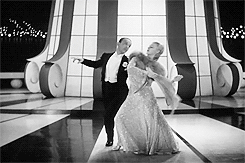
The vortex of the dance (drums rising in a Latin lurch like the thunder of the breakers at Malibu, or some such) hurled them into dizzy union –
“But I think I have the solution,” Lili was saying. “I think a threesome – or perhaps a foursome –”
“Have you slept with Linda?”
A pause ensued. “Why do you want to know?”
“Just curious.”
“Well – yes. And I really believe that this way –”
“Was Phil there?”
Again: a pregnant pause. “Why do you want to know?”
“Just curious.”
“Well – one time he was and one time he wasn’t.”
“Did he join in? The time he was there, I mean.”
“Look – if they agree to a foursome, would you be interested?”
“You have entirely misunderstood me. I’m not the jealous type at all. You should know that by now.”
“I have my doubts,” Lili said.
“And Phil. You have your doubts and you have Phil.”
Interrupted – by a sudden outrageous squeal in the key of Blondell. The drums were gone, and so was the star-encrusted night. In cruel daylight, Franklin and Eric and Edward Everett (his hand still trapped in an egg beater) confronted Ginger and Fred. Waves lapped the beach and dulcet oboes tugged at our hearts.
“Tristan! I’m – I’m – seriously disappointed.” Deep breath, eyes a-pop. The egg beater kind of ruins the gesture of outrage. “You and your very own wife –” (double-take) “I mean, my aunt” (another) “– I mean, Isolde – I mean – well, really!”
Ignoring him, Fred turned eloquently to a stunned (can I say crystallized?) Ginger. “Well, kid – I guess this is good-bye.”
“Couldn’t you turn that thing off?”
“But it’s really good. Couldn’t we discuss all this some other time?”
“Why are you being like this to me? Why are you acting so – weird?”
I said, “It’s the tropical heat out here in the Sahara. Gets to us all eventually.”
“I could call it a dream – a mirage – or a trance –
But no one could call it romance ….”
A single, shrill violin, surf tumbling along the auroral shoreline, a solitary, formally clad figure, dignified but wounded to the quick, staggering across the sands… and Lili’s plaintive: “You’re furious, aren’t you? I can tell. You always shut me out like this when you’re really, really angry. The thing I don’t understand –”
“Let me work it out and call you back. I’m sorry. It’s all my fault and I’ll call you back.”
“When?”
“I don’t know. Tomorrow.”
“I’m going to a concert.”
“I’ll come too,” I said, falsely hearty. “We can talk it all through during the intermission. There’s nothing like sharing good music to alter moods, unify emotions.” I was light of heart, for I knew this to be true. Sometimes.
“No. I’m going with Linda.”
“The more the merrier.”
“I’m really going with Phil.”
“Oh.”
“I may not learn as much about the music from him, but I always feel he’s experiencing me. With you I always feel your attention is really on the music or the play or whatever it is, and I’m just there to help you maintain the fiction that you’re not talking to yourself. That time we were making out during Meistersinger, and then I read your review –”
“Well, I don’t agree with that at all. But call me after you get home from the concert. I’ll be up.” I said this cheerfully, to reassure her that I wasn’t seething or anything, that I thought her date innocuous, not intended to lead to – anything I might want her to interrupt, the way good music had always led to such places for the two of us.
“This isn’t fair to me,” she pled. “I’ve worked up the nerve to call you now. I don’t believe you’re being honest with me.”
“Lili, I want to be completely honest with you. It’s what we’ve always been with each other. It’s what you deserve. Ask me anything and I’ll be as frank as I can be. But this is a bad time to talk.”
“Why? Because you’re watching a fucking movie?”
“Of course not.”
On screen, a shepherd boy (Freddie Bartholemew) was playing his pipe (dubbed by a soprano sax) for the languishing Tristan, whose look of febrile intent became one of the great cabaret standards:
When we dance
I feel myself drifting, my love,
In your arms.
When we dance
I feel the earth shifting, my love,
With your charms.
Take a stance –
The orchestra strikes up that gossamer tune –
You appear by the glance of the moon –
And it’s all I can do not to swoon
In the moon-
Light.
When we dance
I seem to leave body and soul
Far behind
And I’m breathless and deathless while
We’re still entwined
When we dance.
“I think it’s your failure to focus,” said Lili, and for a moment I thought she was referring to the set, which was indeed a blur. That turned out to be intentional, as the dream sequence got under way: Tristan in his delirium seeing five hundred Isoldes, with identical gowns, coiffures, ironic smiles, as they sashayed to the crooning melody in spirals that mimicked (you realized, when the change in camera angle was complete) the Celtic knotwork in the harp by his sickbed.
“You keep drifting off on these intellectualizing tangents whenever I want to talk about us. You put this lens of the arts between you and the world.”
“Are you jealous that I think art and theater and music are important?”
“I’ve always believed in your creativity – you know I have – but you let it obstruct feeling –”
“All artists are obsessed. They have to be.”
Fred-Tristan, alone, mimed the animals in the Book of Kells, yet remained adorably Deco somehow, as he clutched at sinister hallucinations of Ginger-Isolde, partnering pillars of smoke and shade, while lascivious saxes depicted, ever more graphically, his yearning.
“You’ve never cared about me the way I’ve cared about you. You’ve never wanted to nurture, but you’ve always claimed nurture from me. Is it because you’re a man? Are you simply untrained at giving? Would you like to be trained?”
“You mean, sexual giving? Tantric stuff?”
“No. Emotion without sex. Besides sex. During sex. Half the time we make love I feel I’m with a total stranger. As if you were keeping the big story to yourself. It’s as if you didn’t trust me.”
“Maybe I don’t trust anyone. I don’t know if it’s possible for anyone to reach me, to really want to reach me.”
She was moved – I could hear it in her breathing.
“I want to reach you. Can we get together? Tonight?”
“Sure. Come on over.”
“Why don’t you come over here?”
“I can’t leave for a few minutes.”
“You could if you meant what you just said.”
Too swiftly the finale was upon us – Eric in tears, Franklin all doubletake frustration, Edward Everett, mouth agape, Helen sardonic yet courageously sad, and then the apotheosis, the lovers in glistening white, swirling faster and faster, rising through cotton candy clouds in a deafening roar of music –
“I can’t hear you and you obviously don’t want to hear me and I’m sick of this.”
“The situation is too much for me, too, Lili,” I snapped. “I may be just jealous and selfish and egotistical, but I can’t handle it anymore.”
“Well I guess it’s better to know than not know,” she said, flatly, letting me hear the beginning of tears before she hung up, so that I’d feel a proper cad. I did.
On screen, the cast was rolling, over a too-bright reprise of “No One Could Call It Romance,” and was I ever floored:
Brangaene had been Alice Brady all the time!















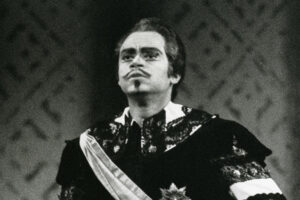
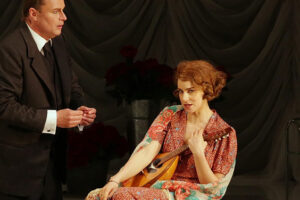
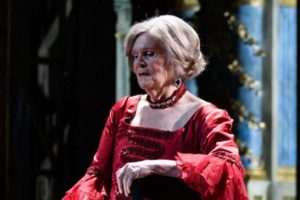






Comments